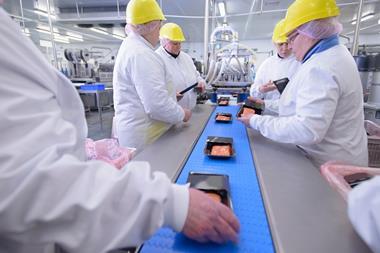The FSA’s move to cut supermarket food safety inspections as part of a shake-up doesn’t show lessons from the past have been learnt.
With the national media obsessed with Boris Johnson’s resignation, it’s easy to forget there is some seismic food policy occurring.
One such announcement, which got next to no coverage when it came out last week, was a plan by the Food Standards Agency (FSA) for a massive shake-up of food safety, which will result in far fewer inspections for hundreds of the UK’s biggest food operators.
The agency has been quietly drawing up plans for a shift towards greater self-regulation, which, although this is a simplification, basically amounts to big companies enjoying a “light touch” regime so cash-strapped local authorities can concentrate their meagre resources going after the “bad guys”.
Coming less than three months after the National Food Crime Unit launched a fraud investigation into a meat supplier to the supermarkets, and a decade since the horsemeat scandal rocked the industry, we are not talking about mere tinkering around the edges.
What is being proposed, or rather enacted because it has already been trialled by seven councils, is a full-scale ripping up of the FSA’s code for local authorities based, by its own admission, largely on the grounds that they no longer have the necessary feet on the ground.
Meanwhile, the FSA admits it too is groaning under the weight of paperwork, not least with the task of dismantling and rewriting great tomes of regulation inherited from the EU under Brexit.
The approach is not new. The Grocer revealed in 2016 that the FSA was recruiting the likes of Tesco to trial a new approach allowing it to tap into the retailer’s systems and data, to help food safety audits keep pace with change.
The lack of frontline resources has, if anything, got worse since then. After the latest scandal broke, FSA CEO Emily Miles told The Grocer she was “really worried” about local authority environmental health and food hygiene resourcing, and the knock-on impact on consumer safety. This was used last week by the FSA in justification of the new code being rolled out across local authorities between now and 2025, with the agency highlighting the number of staff at its disposal to police food standards had halved since the horsemeat crisis.
A ‘fresh look’ at food safety?
Now the UK has left the EU, the FSA says it needs to take a “fresh look at what the future regulatory system should look like”.
As part of its preparations, it has been carrying out pilots with the big five supermarkets: Asda, Morrisons, Sainsbury’s, Waitrose and, again, Tesco. Through the pilots, it has borrowed the supermarkets’ data and food safety systems to see how they could operate as a substitute for failing local authority regimes.
According to the FSA’s own estimates, this could mean some businesses being inspected every few weeks, whilst others might get a visit once every 10 years.
Even this new system could be unmanageable, claim some local authorities, who say they don’t have the funds to even train their staff on the new “matrix” risk system involved.
With councils in such a state, it’s easy to see why the FSA is returning to the idea of tapping into the resources of the big food companies.
However, Dan Crossley, executive director at the Food Ethics Council and a member of the FSA’s stakeholders’ group, argues that given the huge workload lumped upon it by Brexit, the FSA needs substantially more resources to carry out its job.
“I can see the logic in what they are looking at,” Crossley says. “But to roll out the old cliché, the devil is in the detail. It’s very important that food policy is not driven by lack of resources.”
Tim Lang is a critic of the FSA’s plans
Tim Lang, professor emeritus for food policy at City University, London, is among the most vehement critics of the 2016 plans and claims the FSA’s move has echoes of the past.
“This has the whiff to me of what happened at the end of the Major government, when big things were pushed through (mostly privatisation), only to later come to bite us all in the nether regions.
“On the one hand, the FSA is moving (rightly) towards a more complex understanding of risks to and in the food system, yet on the other hand it is taking its hand off the tiller.
“My concern is that it’s de facto sloughing off responsibilities. If I was the food industry I’d resist this, as the onus when bad things emerge will be ‘it’s all your fault’.”
Lang also bemoans the lack of noise from Labour over the FSA’s moves.
“I would expect Jim McMahon [shadow environment secretary] to be speaking out quick as a flash,” he says. “But is he?”
The reality is that the current political and media climate is such that a fundamental review of food safety is not likely to generate too many headlines – until, that is, the next scandal erupts.




















No comments yet